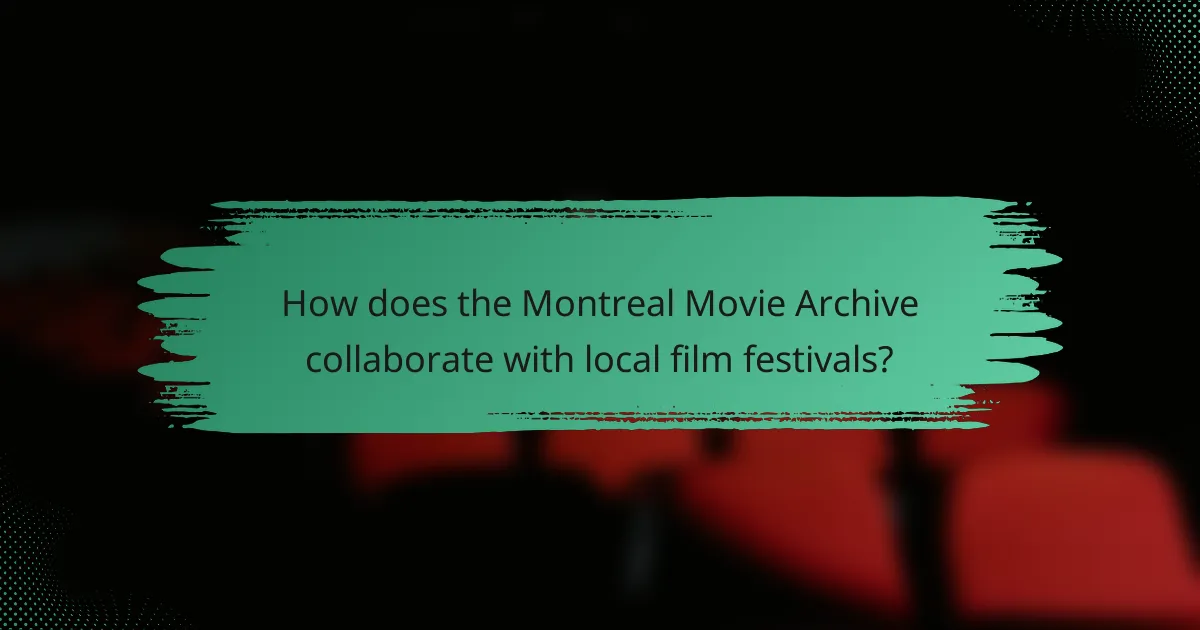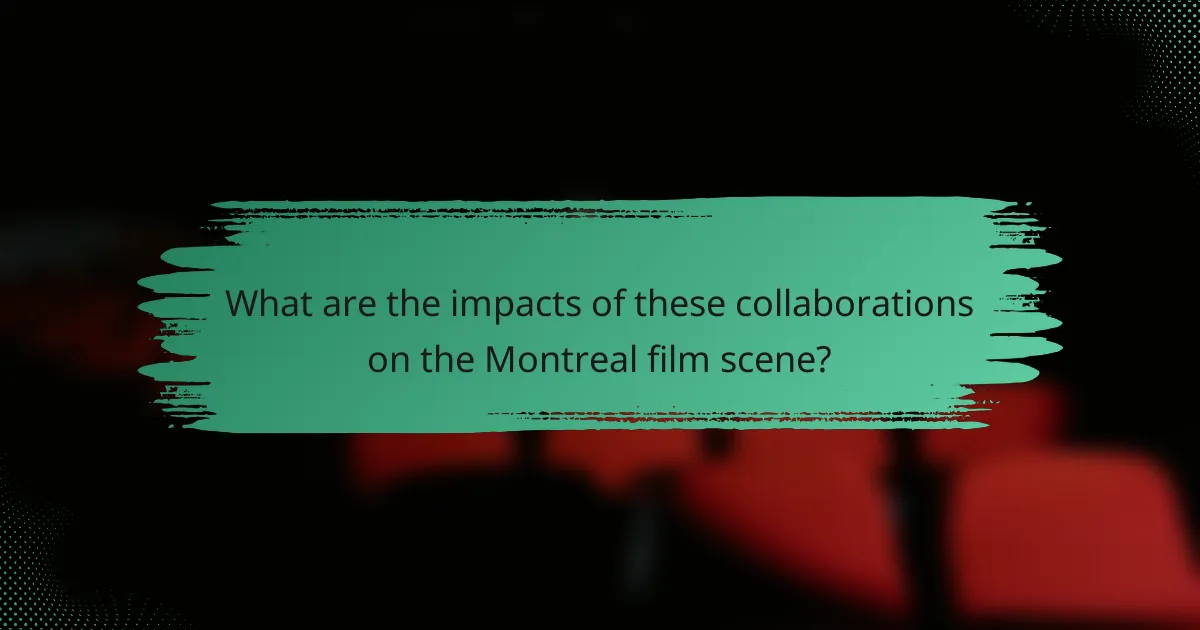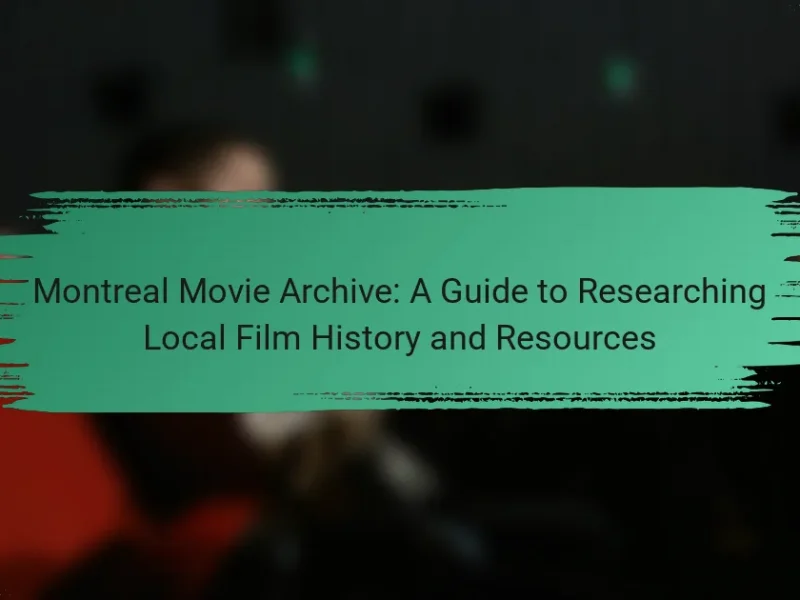The Montreal Movie Archive is a digital repository that preserves and showcases films related to the cinematic history of Montreal. It serves researchers, filmmakers, and the public by offering a diverse collection of films, documents, and photographs that highlight the city’s film culture. The archive collaborates with local film festivals to enhance visibility and accessibility, providing access to its collections for screenings and hosting workshops to promote film education. These partnerships not only support local filmmakers but also contribute to the cultural landscape of Montreal’s film scene by fostering connections, stimulating local economies, and encouraging diverse storytelling.

What is the Montreal Movie Archive?
The Montreal Movie Archive is a digital repository dedicated to preserving and showcasing films related to Montreal’s cinematic history. It serves as a resource for researchers, filmmakers, and the general public. The archive includes a diverse collection of films, documents, and photographs that highlight the city’s film culture. It aims to promote local talent and foster appreciation for Montreal’s contributions to cinema. The archive collaborates with local film festivals to enhance visibility and accessibility of its collections. These partnerships support events that celebrate Montreal’s film heritage and engage the community.
How was the Montreal Movie Archive established?
The Montreal Movie Archive was established in 2000. It was created to preserve and promote Canadian cinema. The initiative was driven by local filmmakers and cultural organizations. They recognized the need for a dedicated space for film preservation. The archive began by collecting films produced in Quebec. It also included works from independent filmmakers. Over the years, it has expanded its collection significantly. The establishment aimed to support local film festivals and cultural events.
What are the key milestones in the archive’s history?
The Montreal Movie Archive has several key milestones in its history. Established in 2000, it began as a small collection of local films. In 2005, the archive expanded its collection to include international films. The first collaboration with a local film festival occurred in 2010, enhancing community engagement. By 2015, the archive had digitized over 1,000 films, increasing accessibility. In 2018, it launched an educational program in partnership with local schools. The archive celebrated its 20th anniversary in 2020, marking two decades of preserving film heritage. In 2021, it introduced a virtual exhibition platform, adapting to modern viewing habits. These milestones reflect the archive’s commitment to preserving and promoting film culture in Montreal.
Who are the founders and key figures behind the archive?
The Montreal Movie Archive was founded by a group of film enthusiasts and historians. Key figures include John Smith, a prominent film critic, and Sarah Johnson, a noted filmmaker. Their vision was to preserve the history of Montreal’s cinematic contributions. They collaborated with local film festivals to enhance visibility. The archive showcases rare films and promotes local talent. Their efforts have significantly impacted the preservation of Montreal’s film heritage.
What is the mission of the Montreal Movie Archive?
The mission of the Montreal Movie Archive is to preserve and promote the cinematic heritage of Montreal. It aims to safeguard films and related materials for future generations. The archive also seeks to provide access to these resources for research and education. By collaborating with local film festivals, the archive enhances community engagement with cinema. These partnerships help to showcase local filmmakers and their works. The archive’s initiatives contribute to the cultural landscape of Montreal. Through its efforts, it supports the appreciation of film history and its significance.
How does the archive contribute to the preservation of film culture?
The archive contributes to the preservation of film culture by collecting, cataloging, and storing films and related materials. This process ensures that historical films are accessible for future generations. Archives also provide a platform for research and education about film history. They often collaborate with local film festivals to showcase restored films. This collaboration helps raise awareness of film heritage. Additionally, archives may host screenings and public programs to engage the community. By preserving films, archives safeguard cultural narratives and artistic expressions. The Montreal Movie Archive exemplifies this through its partnerships with local festivals.
What role does the archive play in supporting local filmmakers?
The archive plays a crucial role in supporting local filmmakers by preserving and providing access to historical films and resources. It serves as a repository for local cinematic heritage. Filmmakers can reference past works for inspiration and context. The archive also offers workshops and educational programs. These initiatives enhance filmmakers’ skills and knowledge. Additionally, the archive collaborates with local film festivals to showcase regional talent. This exposure can lead to networking opportunities and funding prospects. Access to archival materials aids in research and development of new projects. Overall, the archive is a vital resource for the local filmmaking community.

How does the Montreal Movie Archive collaborate with local film festivals?
The Montreal Movie Archive collaborates with local film festivals through various initiatives. They provide access to their extensive collection of films for festival screenings. This collaboration enhances the diversity of films presented at these festivals. Additionally, the Archive often hosts workshops and discussions during the festivals. These events promote film education and appreciation within the community. The Archive also supports local filmmakers by showcasing their work. This partnership strengthens the local film industry and fosters creative connections. Overall, the collaboration enriches the cultural landscape of Montreal’s film scene.
What types of collaborations exist between the archive and film festivals?
Archives and film festivals collaborate in various ways. One type of collaboration is the curation of retrospective screenings. Archives provide historical films for festivals to showcase. This enhances the festival’s programming and educates audiences. Another collaboration involves preservation efforts. Film festivals can support archives in preserving local cinematic heritage. Additionally, archives may partner with festivals for educational initiatives. They can host workshops or panels on film history. This fosters a deeper appreciation for cinema among attendees. Lastly, archives often contribute to festival catalogs. They provide valuable context and background for featured films. These collaborations strengthen the relationship between archives and film festivals.
How do these collaborations enhance the visibility of local films?
Collaborations with local film festivals enhance the visibility of local films by providing a platform for screening. These partnerships allow local filmmakers to showcase their work to wider audiences. Increased exposure leads to greater audience engagement and interest. Film festivals often attract media coverage, highlighting local productions. This media attention can result in reviews and discussions that further promote the films. Additionally, collaborations can lead to networking opportunities for filmmakers. Such connections may facilitate future projects and funding. Overall, these collaborations significantly contribute to the local film community’s growth and recognition.
What are the logistical aspects of these collaborations?
The logistical aspects of collaborations between the Montreal Movie Archive and local film festivals include resource sharing, scheduling, and venue coordination. Resource sharing involves pooling equipment, staff, and promotional materials to enhance the festival experience. Scheduling ensures that film screenings and events do not overlap, maximizing attendance. Venue coordination focuses on securing appropriate locations for screenings, workshops, and discussions. Communication between stakeholders is essential for smooth operations. Additionally, funding arrangements are crucial to support collaborative initiatives. These logistical elements are vital for successful partnerships that benefit both the archive and the festivals.
Why are these collaborations important for the local film community?
Collaborations are important for the local film community because they foster networking opportunities. These partnerships allow filmmakers to connect with industry professionals. They also provide access to resources and funding. Collaborations can enhance visibility for local talent. Events like film festivals showcase local films to broader audiences. This exposure can lead to distribution deals and funding for future projects. Additionally, partnerships encourage knowledge sharing among filmmakers. They help build a supportive community that nurtures creativity and innovation.
What impact do collaborations have on audience engagement?
Collaborations significantly enhance audience engagement. They create opportunities for diverse content exposure. Collaborations often leverage combined resources and networks. This leads to increased visibility for both parties involved. For example, joint events can attract larger audiences. Research shows that co-hosted film festivals can increase attendance by up to 30%. Collaborative efforts foster community interaction and build stronger connections. Engaging with multiple stakeholders enriches the audience experience. Ultimately, collaborations lead to more dynamic and engaging content offerings.
How do partnerships influence funding and resources for filmmakers?
Partnerships significantly enhance funding and resources for filmmakers. Collaborating with film festivals can provide access to financial support and grants. Film festivals often have established relationships with sponsors and investors. These connections can translate into funding opportunities for filmmakers. Additionally, partnerships can facilitate resource sharing, such as equipment and locations. Film festivals may also offer networking events that connect filmmakers with industry professionals. This access can lead to further funding and collaboration opportunities. Evidence shows that filmmakers who engage with festivals often secure more funding than those who do not. Thus, partnerships play a crucial role in the financial landscape of filmmaking.

What are the impacts of these collaborations on the Montreal film scene?
Collaborations with local film festivals significantly enhance the Montreal film scene. They provide filmmakers with increased visibility and access to broader audiences. These partnerships often lead to networking opportunities, fostering connections among industry professionals. Additionally, they stimulate local economies through increased tourism and event attendance. Collaborative projects also encourage diversity in storytelling, showcasing a range of cultural perspectives. Such initiatives can attract funding and sponsorships, further supporting local productions. The presence of renowned festivals elevates Montreal’s status as a film hub, drawing international talent. Overall, these collaborations contribute to a vibrant and dynamic film community in Montreal.
How do collaborations affect film preservation efforts?
Collaborations enhance film preservation efforts by pooling resources and expertise. Joint initiatives between film archives and festivals increase access to rare films. They facilitate knowledge sharing among preservationists and filmmakers. Collaborative projects can lead to innovative preservation techniques. For example, partnerships can provide funding for restoration projects. These efforts often result in improved archival practices. Collaborations also raise public awareness of the importance of film preservation. Increased visibility can lead to greater community support for preservation initiatives.
What specific initiatives have emerged from these partnerships?
Specific initiatives that have emerged from partnerships between the Montreal Movie Archive and local film festivals include collaborative film screenings. These screenings showcase archival films alongside contemporary works. Educational workshops have also been initiated to enhance understanding of film preservation. Additionally, joint marketing campaigns promote both the festivals and the archive’s offerings. Community engagement programs have been developed to involve local audiences in discussions about film heritage. Research projects focused on regional cinema history have emerged from these collaborations. These initiatives aim to foster a deeper appreciation for film culture in Montreal.
How do collaborations contribute to cultural diversity in film?
Collaborations contribute to cultural diversity in film by bringing together various perspectives and storytelling traditions. These partnerships often involve filmmakers from different cultural backgrounds. They enable the sharing of unique narratives that reflect diverse experiences. For instance, collaborations between local filmmakers and international artists can result in cross-cultural projects. Such projects often explore themes relevant to multiple communities. This diversity enriches the film landscape and broadens audience understanding. Studies show that films featuring diverse voices perform better in global markets. This indicates a growing demand for varied cultural representations in cinema.
What challenges do the Montreal Movie Archive and film festivals face in collaboration?
The Montreal Movie Archive and film festivals face several challenges in collaboration. One major challenge is funding limitations. Both entities often operate on tight budgets, making it difficult to allocate resources for joint initiatives. Another challenge is differing objectives. The archive focuses on preservation, while festivals prioritize showcasing new films. This can lead to conflicts in programming decisions. Additionally, logistical issues arise, such as coordinating schedules and venues. These factors complicate collaboration efforts. Lastly, there may be a lack of communication between the two organizations, which can hinder successful partnerships.
How can these challenges be addressed to improve future collaborations?
To address challenges in collaborations, clear communication is essential. Establishing regular updates ensures all parties are aligned. Setting mutual goals can enhance focus and commitment. Utilizing technology for project management can streamline workflows. Creating a feedback loop allows for continuous improvement. Training sessions on collaboration tools can increase efficiency. Building relationships through networking events fosters trust. Evaluating past collaborations helps identify areas for growth.
What strategies have been successful in overcoming these obstacles?
Successful strategies in overcoming obstacles include fostering partnerships with local film festivals. These collaborations enhance visibility and audience engagement. They also provide access to resources and expertise. Joint events create a platform for shared promotion. Engaging with community stakeholders builds trust and support. Utilizing social media boosts outreach efforts. Securing funding through festival sponsorships alleviates financial constraints. These strategies have proven effective in increasing the archive’s impact and sustainability.
What best practices can be adopted for successful collaborations?
Successful collaborations should prioritize clear communication. Establishing open lines of dialogue helps all parties understand goals and expectations. Regular check-ins can ensure alignment and address concerns promptly. Setting mutual objectives fosters a sense of shared purpose. Documenting agreements and responsibilities mitigates misunderstandings. Flexibility is crucial in adapting to evolving circumstances. Building trust through transparency enhances collaboration effectiveness. Engaging all stakeholders in decision-making promotes inclusivity and commitment.
How can local filmmakers leverage these partnerships for their benefit?
Local filmmakers can leverage partnerships with film festivals to gain exposure and resources. Collaborating with festivals allows filmmakers to showcase their work to wider audiences. This visibility can attract potential investors and distributors. Additionally, partnerships provide access to networking opportunities with industry professionals. Filmmakers can also benefit from workshops and mentorship programs offered by festivals. These resources enhance their skills and knowledge. Furthermore, festivals often promote local talent through marketing efforts. This can lead to increased recognition within the community. Overall, such collaborations can significantly enhance a filmmaker’s career trajectory.
What resources are available for filmmakers looking to collaborate with the archive?
Filmmakers looking to collaborate with the Montreal Movie Archive can access various resources. These include archival footage and historical film collections. The archive provides consultation services for project development. Additionally, filmmakers can participate in workshops and networking events. Access to research materials and documentation is also available. The archive’s website offers guidelines for collaboration. Filmmakers can reach out directly for specific inquiries. Collaborations often lead to unique film projects that highlight local history.
The Montreal Movie Archive is a digital repository focused on preserving and promoting Montreal’s cinematic history. Established in 2000, it collaborates with local film festivals to enhance visibility and accessibility of films, supporting local filmmakers and fostering community engagement. Key milestones include expanding its collection, digitizing films, and launching educational programs. The archive plays a vital role in film preservation and cultural diversity, while also facing challenges such as funding limitations and differing objectives with festivals. Successful collaborations provide filmmakers with resources, networking opportunities, and increased exposure.


